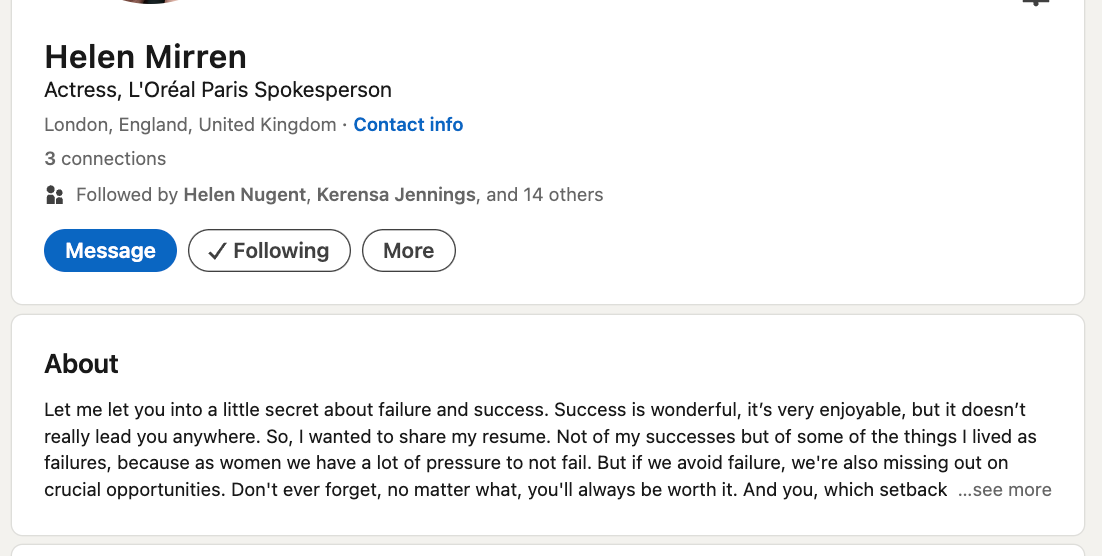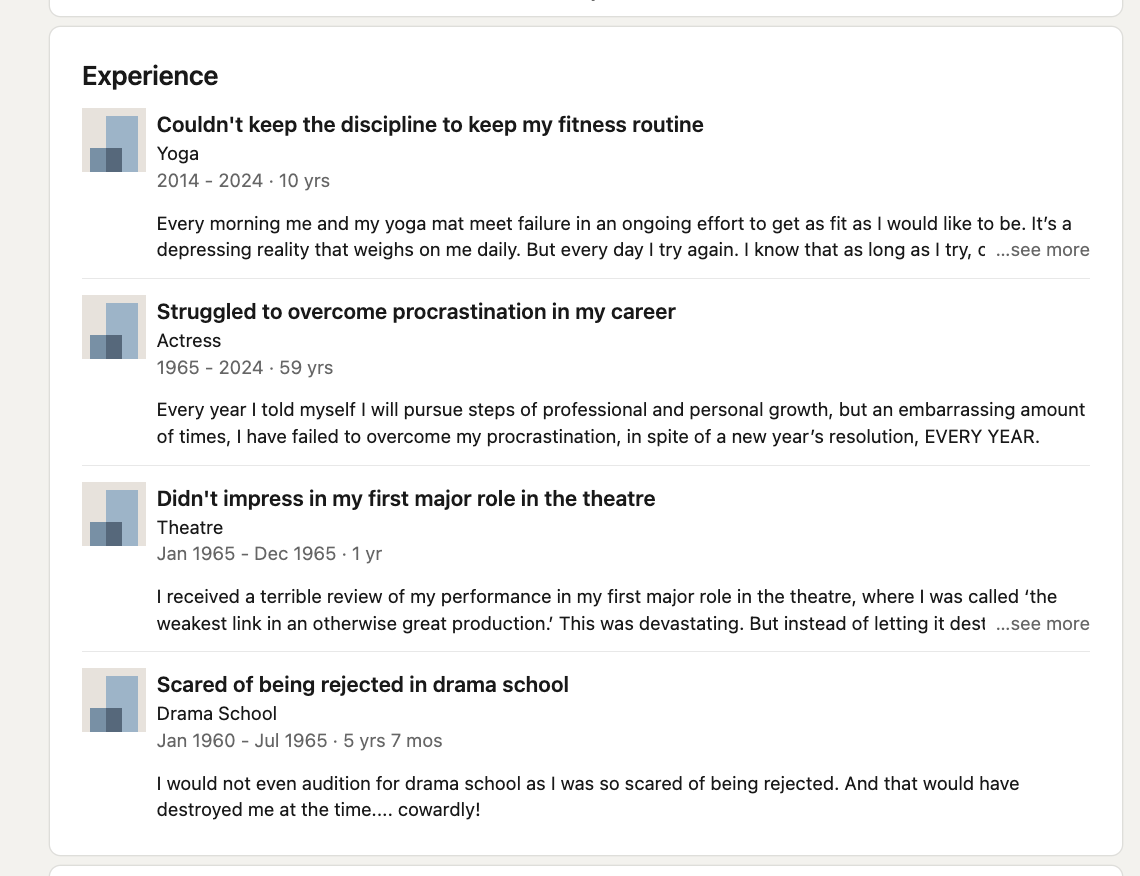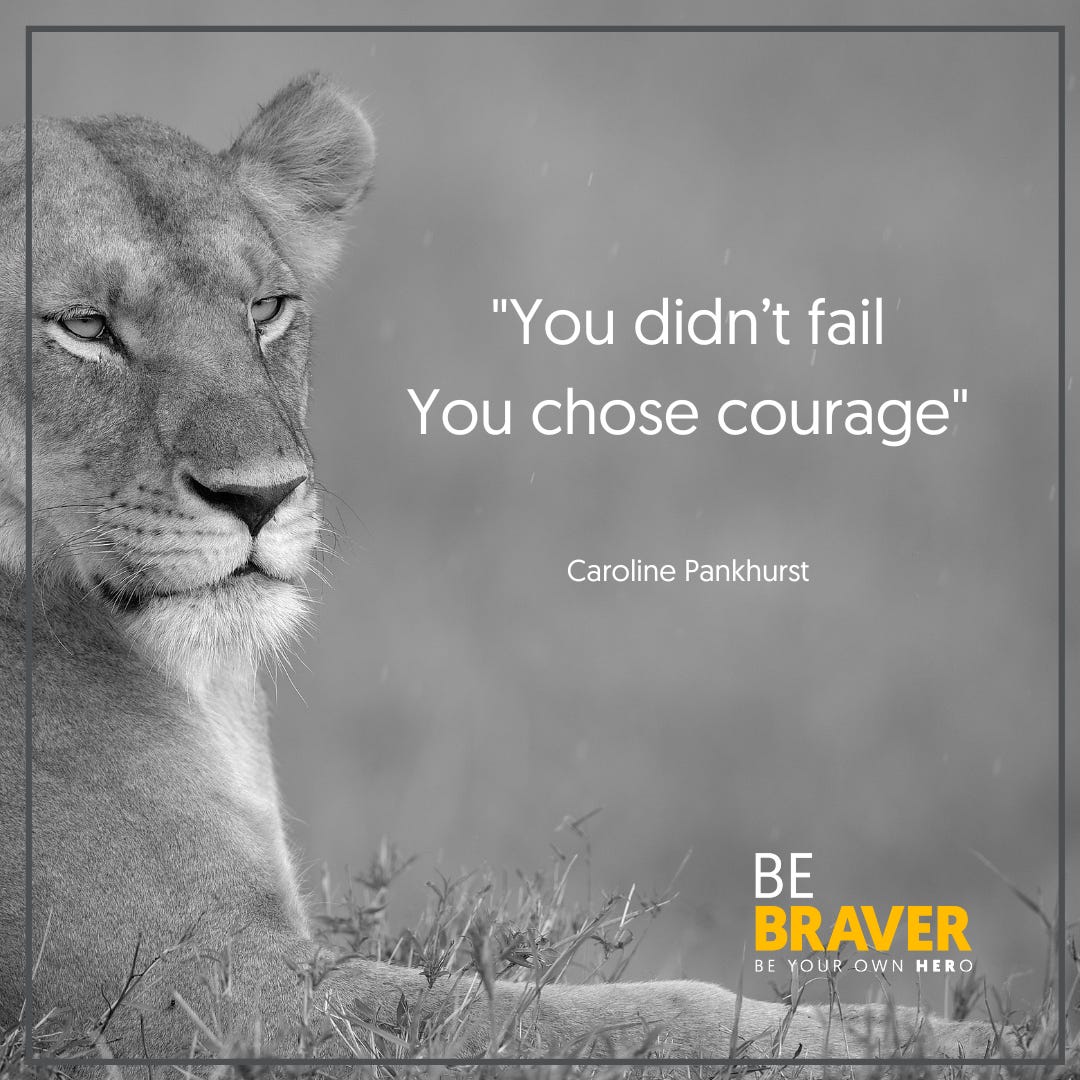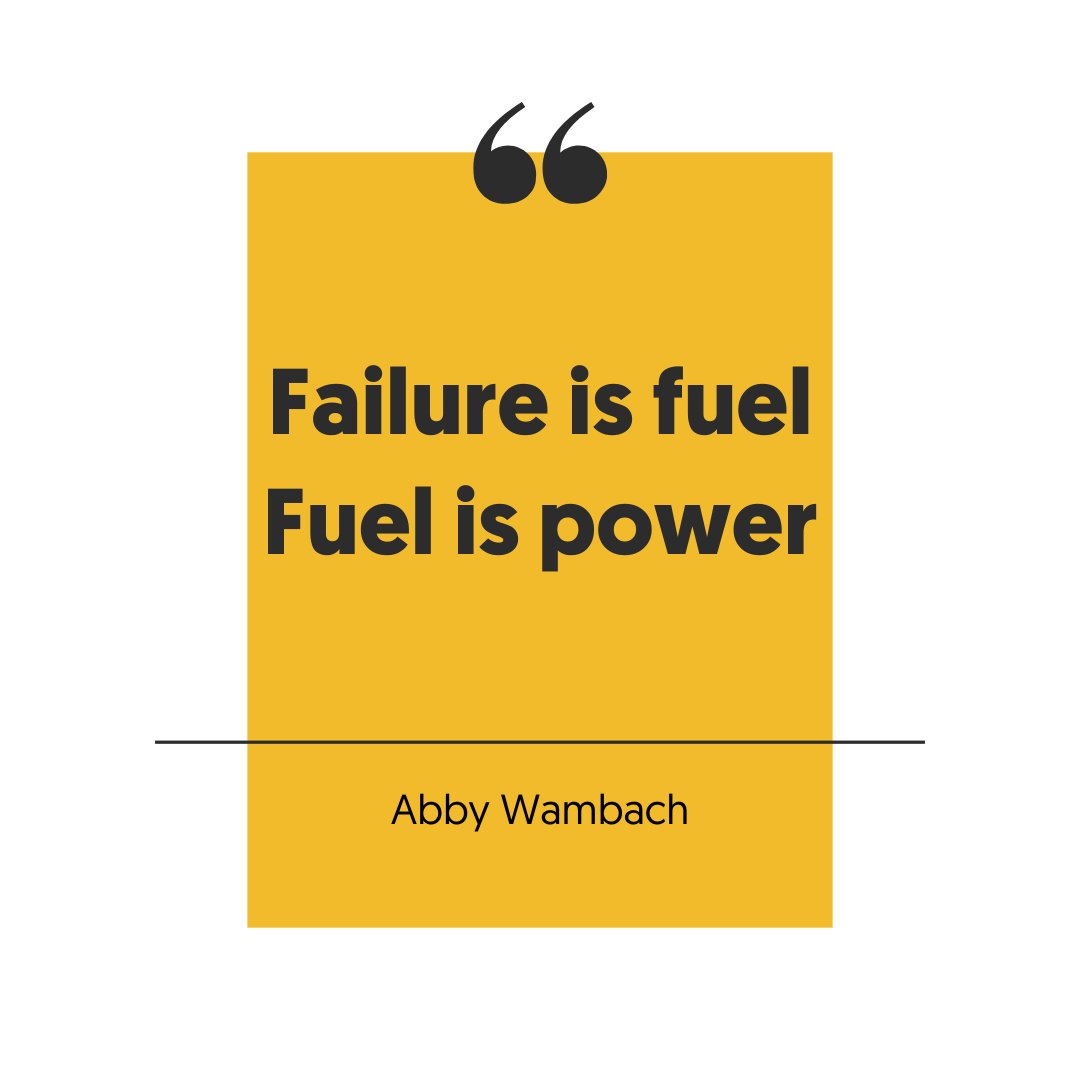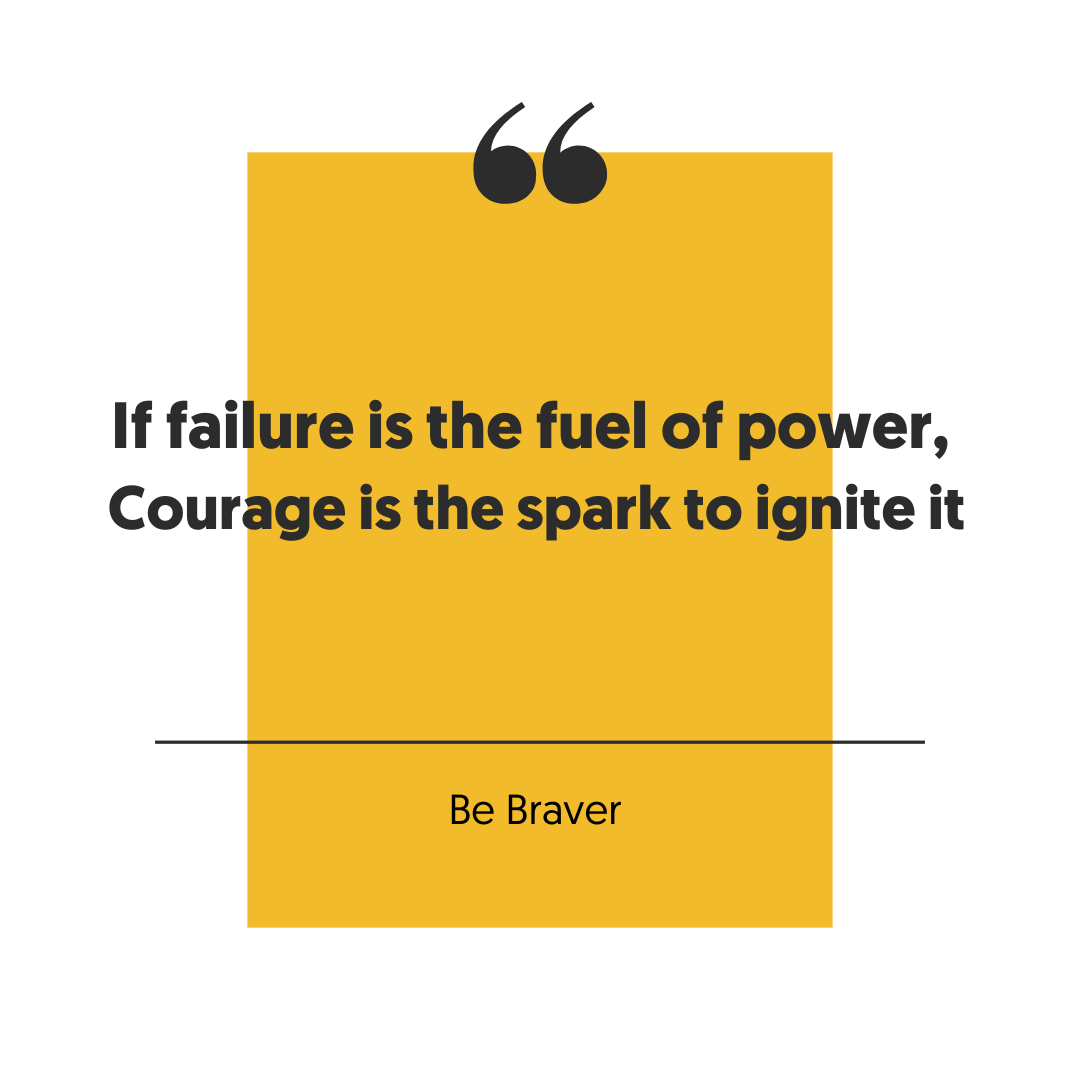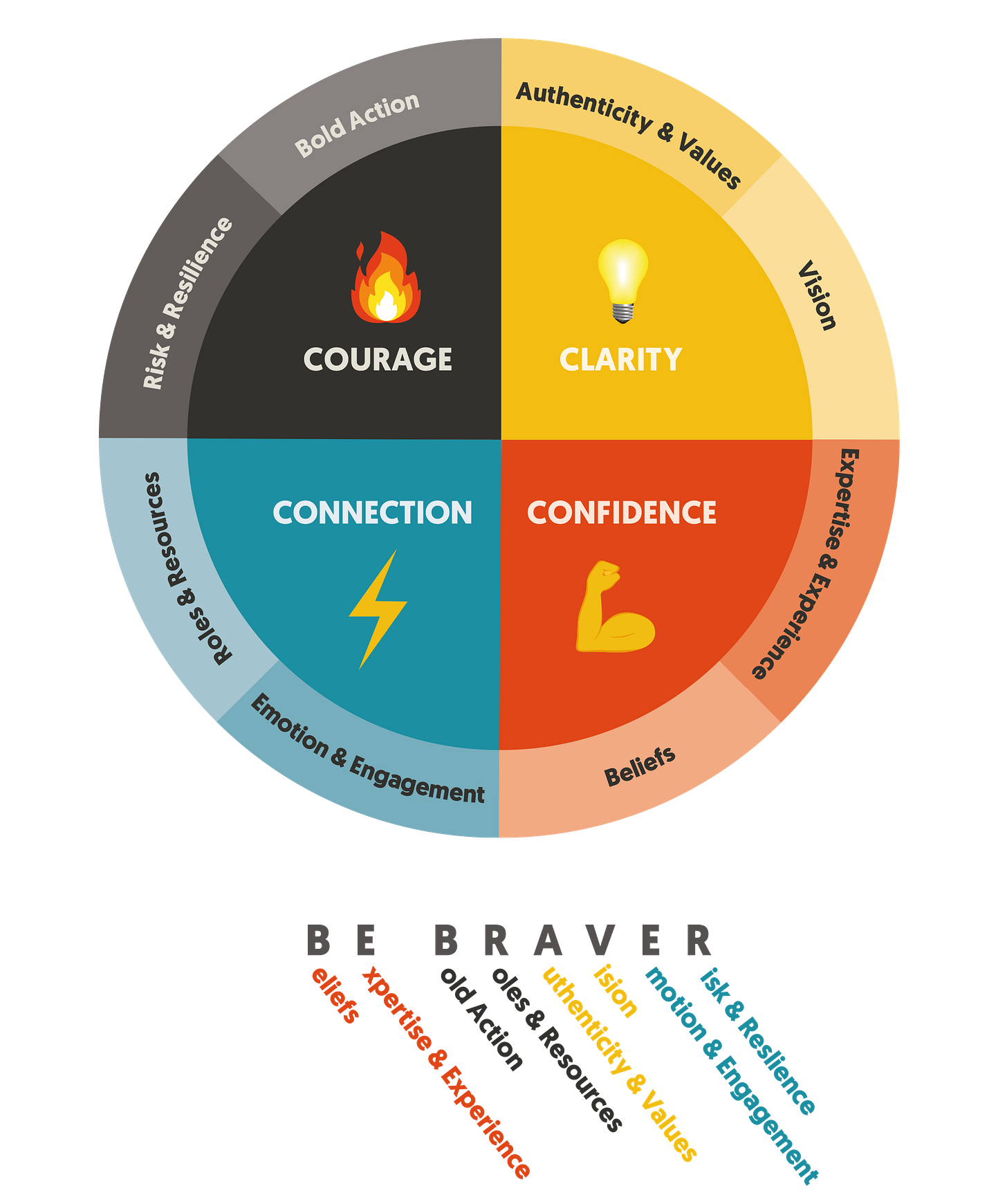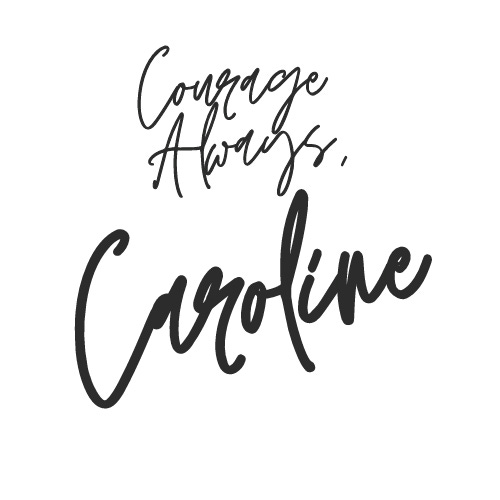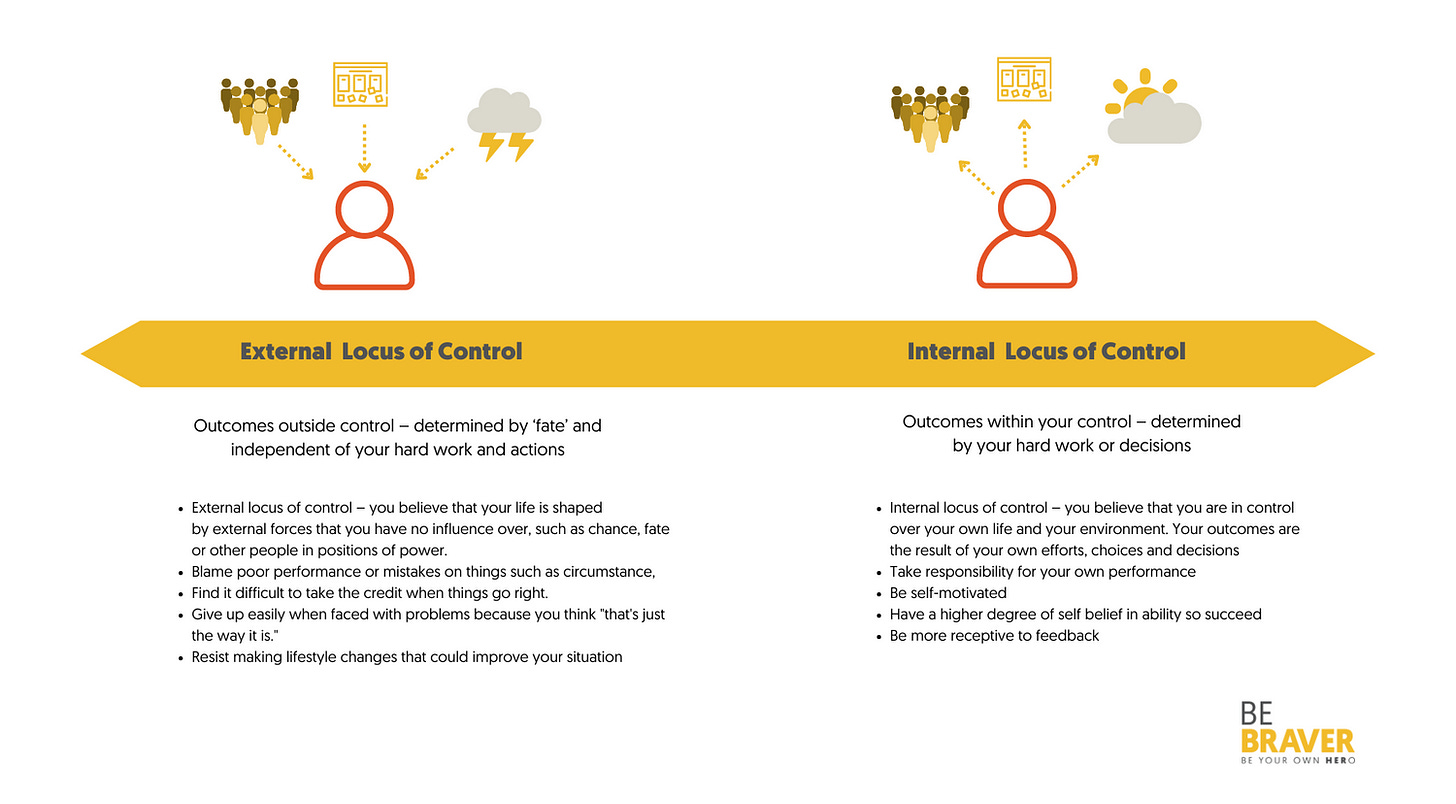Rethinking Failure
Because I'm Worth It
‘Because I’m worth it’
We didn't fail when we made a decision to do something with a risk and uncertainty that gets an undesirable outcome. We chose courage.
Hello You,
Up until this week for some reason whenever I heard ‘Because I’m worth it’ I used to think of Eva Longoria.
As of this week I’ll starting thinking of Helen Mirren and the #worthitresume. A campaign celebrating the failures we accumulate on the path to success.
A campaign where Helen describes, failure as the fuel that motivated her to spend 5 years mastering Shakespeare after some rather scathing reviews. You can see the linked in video here.
I posted a comment on the Linked In post saying that instead of saying ‘I failed’ we should say ‘I chose courage’. Which a few people have responded to me privately about.
Including one ask ‘where are other words of wisdom you share on courage and bravery in the workplace’ ‘do you have a podcast?’.
As it happens I’d love to have a podcast. I have a great idea for one should anyone wish to sponsor it. But alas, I do not. So I thought I’d share more of my thinking on courage and failure here.
We have an aversion to failure in a culture and society that lauds success - yet in truth, for anyone that has accomplished anything in life, it has taken numerous hard earned lessons to get there.
Many of my Clients have prided themselves on accelerating in their careers with a perfectionist mindset, thinking this has been the secret to their success. Yet that becomes a self limiting belief as anything other than perfection, or falling at the first hurdle, is seen to be an absolute disaster. Derails them. Catastrophic thinking ensures. Anxiety. Procrastination. Confirmation bias1. Cycles of unhelpful thinking. Inner critics goes in to overdrive.
Failure hits some so hard it can seriously hinder careers, businesses, lives and even love. Creating fear, and making opportunities and growth impossible to see. And yet when we begin to flip our thinking about failure and see courage, it can really be so a very different experience. Failure can even be something to be proud of.
Why Does It Hit Some Of Us Harder Than Others?
Lets understand the resistance first of all.
If our identities and sense of self are so interconnected to the outcomes of our decisions, when the outcomes are often beyond our control, when we don’t realise the intended outcome, we experience shame, anxiety, self doubt. We judge ourselves on the impact that variables we couldn’t control had on the result. We limit and diminish ourselves by being overly critical.
It’s a bit like we are looking at measurement incorrectly. Have the wrong KPI’s.
I absolutely do not think we shouldn’t be learning, holding ourselves accountable or reflecting on what failure offers us. Gaslighting an undesirable outcome. However the learning itself can be real treasure when we don’t hit gold. We can also acknowledge the strength of character it took in trying something.
There’s a balance to be had - we don’t want to be beating ourselves with a stick unduly because, in the words of Adam Grant2, we failed to think like a scientist about our assessment of a failure.
There is a whole world of difference between intending to fail, and failure being a consequence of ambition, growth and the road to improvement and success.
I’ve yet to meet a client who failed for anything other than pursing something with good intention. Plus let’s be real, leadership sometimes asks we make a choice between only undesirable outcomes, when any options might be that hot.
What causes those who are less resilient to failure to be so consumed and diminished by it?
We can look to society, the self, our organisational culture and our leadership. All of these to a greater or lesser degree will have an impact on our experiences and expectations. We can also look to how we frame and understand failure, and we can look at how we situate it in relation to choosing courage.
Society & The Self
Individually and collectively from a psychological perspective we have an aversion to failure. We fear rejection, not belonging. Are scared of the cost of failure. Want to avoid the discomfort that it brings socially.
We might operate in an organisation that is more punitive towards failure. We don’t really want to be in those organisations truth be told, but we might have to be for now.
We may have a negativity bias3, a locus of control (see more in the footers on that4) that is skewed to one extreme or another. We may over afford our attention to the outcomes, often something that we can’t control, at the expense of noticing the merits of the decisions we made and the intentions behind our decisions.
We might be too ashamed to see how the lessons of our failure can fuel what we choose to do next.
Framing Failure: The Fuel of Power
In a rousing commencement speech by the American soccer player Amy Wambach-Barnard, she called for women to see themselves as wolves, not little red riding hood. She explored how we have been socialised to ignore our curiosity and not veer off the path, to stay in our lanes, and offers some salient lessons in how to form a collective with a unified heart beat, and the perspective she found critical to how athletes understand the significance of failure.
“Make failure your fuel. Non athletes don't know what to do with the gift of failure and waste it. Failure is not something to be ashamed of, it’s something to be powered by. It’s the highest octane fuel your life can run on” Amy Wambach-Barnard
Self awareness asks we understand our own response to failure better. To not be self limited.
Leadership asks us to have other awareness. To consider how our team and cultures respond to failure, to ensure the conditions are right for it to be safe to fail and to understand the value and different types of failure.
When we can discuss, prepare and learn from failure, we are better equipped to choose courage and celebrate it. To realise the gains of it.
How much more powerful and enabling is it to be able to say ‘we chose courage’ rather than ‘we failed?’. When we don’t recognise our failures are a mark of courage, we discount our bravery potential massively. Because for every courageous success story, there will be a courageous story where the outcome didn’t realise it’s intentions. It makes it no less courageous.
Last week I had a truly wonderful conversation with Dr Hayley Lewis, Psychology at University of London and Founder of Halo Psychology who bravely told that it still takes courage for her to tell her students that she failed at her masters the first time around. Why did she tell me? Why does she tell them?
Because she is a courageous leader. Recognises that courage inspires courage, knows the value of failure as part of the journey of becoming, and wants to encourage her students to not be diminished when the going gets tough. I could have talked to her for hours. I feel inspired to get my book finished just to include her stories.
So how do we figure out how to have a better relationship with our failures? And in our teams and organisations?
How do we relinquish our identities being linked to a failed outcome and shift our mindset to finding the learning, and dare I say it, pride to be found in a failure?
Is it even possible to be proud of a failing?
Would you prefer to feel shame of failure or proud of it?
Resilient individuals don’t fail less, they are less prone to perfectionism and less likely to hold themselves to unrealistic standards.5
A study in to Olympic competitors third place with a bronze, were actually able to frame their medal as a success and find joy, rather than find regret in their outcome compared to those with silver medals, because of the power of how they framed the outcome.6
Learning To Critique Failures
Amy Edmundson7 has published an excellent book on the topic of learning and failure. The Right Kind of Wrong, which I recommend all leaders read. There are decisions we make that can lead to mistakes, or errors or failures. Perhaps even we’ve not consciously made a decision that lead to a failure.
She defines a failure as an outcome that deviates from desired results. A lack of success. Failing to achieve an award for example.
Errors, are unintended deviations from pre-specified standards, procedures or rules. These are synonymous with mistakes. You might have published a report without the wrong data set. If it’s of grave significance and was the companies annual report, that would be a mistake. If it was a presentation that went to Client that was the wrong version attached, that would be an error. Neither of them were intentional.
"There is no innovation and creativity without failure. Period." ― Brene Brown
Failure then, is the land of courage. Its not standards, processes and rules. It’s discovery, innovation, growth, uncertainty, the land of the new. It’s intended to move us to success. Further forwards. Knowledge, change. Progress.
So there is a risk. A risk it’s going to fail. To not achieve the intended or desired outcome.
In Be Braver, when we choose courage, there is clarity, confidence and connection sitting behind that decision. In a sense, there is a preparedness for failure. We know exactly what purpose the decision serves, why we have motivation for doing it, what it says about the person we are becoming, the future we are creating. We know what is within our control and what is outside of our control. What is at stake in not risking failure.
We accept that the most important thing we are accountable for and will measure ourselves by, is the merit of the decision. Not the outcome. Because if there is a risk involved, there are things we can’t control, so we can’t be accountable for those.
We don’t make the decision intending to fail. Far from it. We make the decision to speak up, to say yes, to take the contract, to press publish, to include the data, to exclude the data, on the basis of having clarity, confidence and connection.
Courage and Failure
You will recall times when you made an intentional decision to take a risks, in pursuit of a noble goal, an ambition progress, innovation. Whatever it might be. It failed. The outcome. The result. You didn’t fail.
Courage is a decision to take a risk. It’s an intentional acceptance that the intention our outcome you realise might not be desirable, it might therefore be a failure.
How we respond to failure is a critical part of practicing a Be Braver mindset and being a person who recognises their courage.
For Clients that tend to be over self critical, afford successes to others and failures become an all consuming reflection of the self, I find it very helpful to sit with the paradox of these two perspectives on where you think the locus of control falls heavier in given situations. To explore that in reality perhaps its not quite so cut and dried, black or white, me or other.
"Courage allows the successful woman to fail and learn powerful lessons from the failure. So that in the end, she didn't fail at all." ― Maya Angelou
Cause and effect is rarely black and white. Much like the decisions that can lead to successful outcomes, sadly aren’t actual always actually the direct result of our decisions or actions.
Is "I Chose Courage'“ Simply Toxic Failure Positivity?
I am all for the idea of re-thinking how to view failure, and situate it in our identities and cultures. Which is in part why I have repeatedly suggested that instead of us carrying a narrative of ‘I failed’ we start to say ‘I chose courage’ instead.
This isn’t simply me trying to put a positive white wash on undesirable outcomes however, so I want to expand a little bit in here on what I suggest to my Clients when I hear then talking about their failures we reframe it to ‘I chose courage’.
Research in to conflict management has shown that differentiating between task conflict and relationship conflict can significantly improve the means in which we tackle difficult situations in the workplace. Helping leader to separate interpersonal conflict from the technicalities of the actual task in hand.
Self awareness is critical for leadership, growth and personal development. We must of course be able to hold ourselves accountable and look at the self as much as outwards to learn our lessons.
“Success is not final, failure is not fatal: it is the courage to continue that counts.”
- Winston Churchill
However, when we over personalise the results of decisions we made, when the factors which influenced the result we over afford and diminish ourselves in ways which are unjustified and overly harsh. We do not serve ourselves or our teams.
There is a balance to be found in the extent to which we blame ourselves for the outcome of the decisions we made, when the forces that determine the outcome might be nothing to do with us. Often what we chose to to next is what speaks the loudest.
‘I failed’ ‘I am a failure’ personalises a situation and becomes and all consuming identity. I chose courage suggests I know there was a risk, I accepted the risk of an undesirable outcome and I chose to take the risk. In pursuit of the leader I am becoming, the business I am growing, the future I am creating.
As always, I’d love to know what you think.
Better still, if you’d like to find out more about working together, with you, your team or your organisation - to bring my awesome network of associates to create sparks, fuel fires, and fan flames to accelerate growth, innovation and creativity. Build a Be Braver mindset. Please get in touch. Workshops, coaching, speaking, programmes - all of them deliver ❤️🔥.
Recent Favourite Linked In Posts Related To Failure……
And this wonderful one on how listening and patience creates space for wdonerful things.
https://journals.sagepub.com/doi/abs/10.1080/00335557743000053
https://adamgrant.net/book/think-again/
https://journals.sagepub.com/doi/10.1207/S15327957PSPR0504_2
https://pubmed.ncbi.nlm.nih.gov/27918887/
https://www.penguin.co.uk/books/446902/right-kind-of-wrong-by-edmondson-amy/9781847943781


